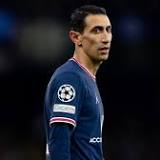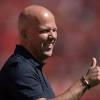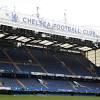What is Cristiano Ronaldo at 40?

Cristiano Ronaldo has not mellowed with age. Time has done nothing to soften his sharp edges, to temper his competitive zeal, to slow his unrelenting drive. The old fire still burns, the flames glowing as fierce and bright as ever against the gathering twilight.
A case in point: late last month, Ronaldo and his Al Nassr team-mates were easing to victory against Al Fateh in the Saudi Pro League. The game was in its dying embers, entering the last of six minutes of stoppage time, when Ronaldo found himself in a pocket of space inside Al Fateh’s box.
He shimmied, feinted, accelerated, a move that is still — after all these years — somehow recognisably his. The angle was tight, unfavourable, but no matter: he cracked a shot so fast, so ferocious that the ball appeared to go both over and directly through Peter Szappanos, Al Fateh’s flailing goalkeeper.
As he wheeled away to celebrate, Ronaldo saw the flag: there had been an offside in the build-up. It made no material difference to the result. Al Nassr would simply win 3-1, not 4-1. His reaction, though, was one of pure, undiluted rage.
As the final whistle blew, Ronaldo approached the fourth official, remonstrating with him over the decision. “Always against me,” he shouted in the general direction of a television camera. “You always cancel my goals.” As he approached the tunnel, still inflamed by the injustice of it all, he saw Piers Morgan, the broadcaster and provocateur who certainly seems to regard himself as one of Ronaldo’s friends.
“You were robbed,” Morgan told him, dutifully.
“They don’t like me to score goals,” Ronaldo replied.
This is, it has to be said, towards the more improbable end of conspiracy theories. Ronaldo is not just Al Nassr’s star attraction; he is the centrepiece of Saudi Arabia’s entire football project, a player so famous and so popular that the ruling elite of the country believes a whole sporting culture can be built around him. On balance, they probably quite like it when he scores goals.

That Ronaldo was so angry that he could believe it, in that moment, goes some way to explaining his longevity. He has been such a constant, totemic presence in football’s consciousness that it is easy to forget quite how long he has been around. He made his professional debut before the invention of Facebook. He joined Manchester United four years before Apple unveiled the first iPhone.
In the years since, he has played almost 1,300 games, for club and for country. He has scored close to 1,000 goals. He has broken so many records that he might have a claim to the one for most records broken. He is, by both his own estimation and that of a significant proportion of the viewing public, the greatest player who has ever lived. “I am the best in history,” he told the journalist Edu Aguirre in an interview that aired on Spanish television this week. “I believe so, sincerely. I have not seen anyone like me. Numbers don’t lie.”
By the same logic, he is quite possibly the most famous person in the world: Ronaldo has 648 million followers on Instagram, nearly twice as many as Kim Kardashian and which would be enough to make him the third-most populous nation on the planet. It is both absurd and accurate to suggest that Ronaldo is one of the most famous people who has ever lived.
As he turns 40 today, he would be forgiven for starting to think about winding down. His legacy is secure. He has achieved far more than even the most ambitious dreams he might have harboured while growing up on the Portuguese island of Madeira. And yet, even when deprived of a meaningless goal in a game long since won, he cannot stop himself. All of it — every game, every goal, every moment — still matters. The old fire still burns, so fiercely and so brightly that it is hard to imagine what he might do when it does, eventually, go out.

GO DEEPER
Ronaldo's new life in Saudi: Private shopping, luxury hotels & Messi taunts
The framing and the phrasing can change, a little, but the answer is always the same: not yet. Ronaldo is asked about retirement every time he grants an interview. Almost a quarter of a century on from his debut, he knows that it is a question he has to be asked. It is a question, doubtless, that he asks himself.
“I don’t really think about it consciously,” he told Aguirre this week. “I know it is near. I speak a lot with Pepe, and he tells me that he’s better than ever. I think about going for as long as possible, until I can’t give any more, so that I can be proud of myself.” That might, he said, mean playing until he is “40 to 42 years old”, but in reality it is likely to be less a date than a feeling: he has previously said that he will retire, effective immediately, the moment he no longer feels “motivated”.
That does not appear to be imminent. It requires a degree of guesswork to establish what it is that keeps Ronaldo going. Although he has always said he will “move on” from the Portuguese national team as soon as he feels he is “not contributing anything”, that moment has not yet arrived; it feels fair to wonder if he hopes to play in one more World Cup, not least to ensure he does not lose ground to the 37-year-old Lionel Messi (both have featured in every edition of the tournament since 2006).

In his interview with Aguirre, he was also slightly dismissive of what he cast as a public obsession with his pursuit of 1,000 career goals. He is currently on 923; it would have been 924, of course, had the one in stoppage time against Al Fateh counted. “People keep talking about the thousand goals,” he said. Given how aware he is of his numbers — and given the weight he puts on them — it is very difficult to believe, though, that he is not keeping count, too, or that he might step away on 987.
There may be another factor, one that unites players regardless of their prowess or their prestige. Retirement would mean Ronaldo leaving not just the only job he has ever had, but the only identity he has ever known. He would not be the first to be intimidated by the looming need to figure out what he will be when he can no longer be a player.
Over the years, he has at least whittled down his options somewhat. He does not want to manage. “I don’t see it,” he told Aguirre, a sentiment he has expressed more than once previously. “It seems almost impossible to me.”
He is, obviously, far too famous to spend his retirement as a talking head on television, exchanging views on the state of Crystal Palace’s back three with Gary Neville. If he is to remain in football, then the only feasible route would be as the owner of a club. “I wouldn’t discount it,” he told Aguirre, but nor did he sound particularly enthused.
Instead, he said, he wants to “learn about other sectors, to do things I don’t know”. He already has a wide array of business interests: he has, over the years, invested in everything from hotel chains to hair transplant clinics to Ronaldo-branded champagne and fragrances. He has a line of underwear and a sports management firm. He was part of a consortium that bought a Portuguese publishing house. He is not just an ambassador for but an investor in Whoop, a wearable technology company.

He could, quite comfortably, spend his post-playing years living off the fruits of his investments, entrusting his financial advisor, Miguel Marques, to make more. He is unlikely ever to be short of endorsement opportunities, ones to sit alongside the dozens he has made over the course of his career.
The chances of that are slim. Not just because Ronaldo does not seem the type to fade quietly into the background, that raging competitive spirit redirected at flicking through quarterly reports and projected yields, but because the question of what Ronaldo does when he retires from football is, in truth, a false one.
Ronaldo long since slipped the bounds of being just a footballer; it has, for years, been just one aspect of his brand. He should be understood not just as a sportsman but a celebrity and an influencer. His fame is such that he cannot retire, not really. He can only find another way to sustain, control and build it.
It was fitting, really, that Ronaldo arrived on YouTube and broke a record almost immediately. Within 90 minutes of launching his channel, UR Cristiano, last August, Ronaldo had acquired a million subscribers: a growth rate unprecedented in the platform’s history. Within a day, that had risen to 15 million. Five months on, he has attracted 73.5 million.
Although his output has been a little patchy — he has posted 90 videos so far, although the majority tend to come in flurries followed by bouts of relative quiet — there can be no faulting his effort.
The aesthetic is anything but homespun: the productions are so polished as to be glossy. He has dispatched reporters to interview former team-mates, sat down with Rio Ferdinand, involved both his wife, Georgina, and his eldest son, Cristiano Jr. He has made an attempt, too, to ingratiate himself with the true stars of what is, for him, uncharted terrain, collaborating with MrBeast, exchanging messages with at least one Paul brother.
He did not need, not in the truest sense, to commit quite so wholeheartedly to the project. He already has Instagram as a way to reach his public. Even if he decided to engage with YouTube, his inbuilt audience is such that his mere presence on the platform would likely have guaranteed viewers, regardless of the quality of what he was creating.
That he has chosen to take it seriously, then, suggests this might be central to how he views the next stage of his career. The clock might be ticking on his days as a footballer; there is no such limit on his timespan as an influencer.
“His collaboration with MrBeast marks a shift in how legacy icons engage with digital audiences,” said Louise Johnson, chief executive of Fuse, a sports and entertainment marketing agency. “It’s a new way for established stars to reinvent themselves in the digital economy. Their crossover underscores that traditional celebrities have to actively participate in digital culture.”
That comes with commercial benefits, obviously: a YouTube presence of the sort that Ronaldo can now boast is something that appeals to brands, something that can be directly monetised. “It can definitely add value to sponsorship deals,” said Richard Gillis, of The Unofficial Partner, a podcast examining the intersection of sports, business and marketing.
The primary appeal, though, may be different. “Brands are either warm or cold,” Gillis said. “By cold you mean a little bit more transactional, rather than personal, and I’d say Ronaldo’s skews more toward the cold. He has a lot of deals with a lot of companies, but I’m not sure they really tell you what he stands for.”
YouTube offers a way to counteract that. Although its aesthetics have changed — MrBeast’s content now habitually costs millions of dollars just to produce — there is still an underlying current of what Gillis calls “radical transparency”, an understanding that it is authentic, unmediated in a way that television is not, even if that is not entirely true.
“It allows creators to control their image but still to create the impression that it is actually you,” he said. The appeal of that to Ronaldo, long used to living his life in public, is not hard to fathom.

Just as importantly, it allows him not only to continue to reach the audience he has established over the two decades of his career, but to develop a relevance in the eyes of a younger demographic, not just to sustain his fame but to expand it.
“Digital media has made traditional celebrities rethink how they connect with audiences,” Johnson said. “Especially younger generations who may only know Ronaldo from his Al Nassr days, rather than his legacy at Manchester United or Real Madrid.”
Ronaldo knows, at some point, that his time as a footballer will come to an end. But he knows, too, that that is not the same as retiring. He has not just been a footballer for some time. He is many other things, things that will not change, whether he continues to play or not. He will have to leave the field, eventually.
He has done all he can, though, to make sure that is not the point where the applause stops.
(Top photo: Getty Images; design: Eamonn Dalton)


 Malaysia
Malaysia Argentina
Argentina  Australia
Australia  Austria
Austria  Brazil
Brazil  Canada
Canada  Germany
Germany  Ireland
Ireland  Italy
Italy  Mexico
Mexico  New Zealand
New Zealand  Poland
Poland  South Africa
South Africa  United Kingdom
United Kingdom  United States
United States 
























